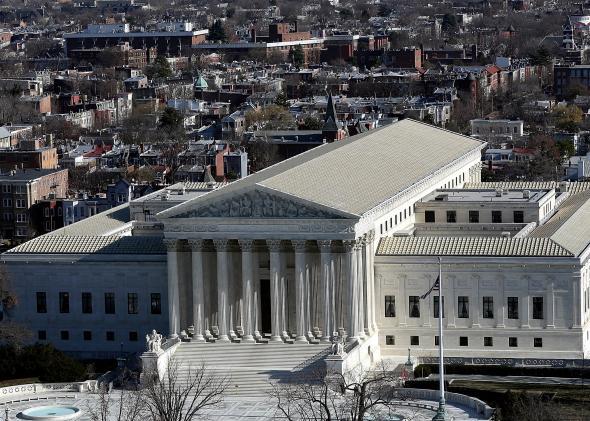This holiday season has been a happy one for gay marriage—and a depressing one for its opponents. First, last Thursday, New Mexico issued a game-changing opinion legalizing gay marriage in the state. Then, on Friday, a federal judge in Utah overturned that state’s gay marriage ban, and the 10th Circuit refused to stay the ruling, meaning gay marriages will proceed in Utah for the foreseeable future. Finally, on Monday, a federal judge forced Ohio to recognize a legally performed same-sex marriage on a death certificate, clearly inviting a more direct challenge to the state’s gay marriage ban.
But for all that progress, the lurking question remains: What will the Supreme Court do? Following the Windsor ruling, many commentators worried that the court would be hesitant to take the next logical step and rule all state-level bans unconstitutional. (The justices’ punt on the Prop 8 case would seem to suggest as much.) But with the basic constitutional theory behind these challenges now enshrined in precedent, several potential Windsor sequels are bound to arrive on the court’s doorstep—and one of them is destined to make it onto the docket. Here’s a look at the contenders.
Kitchen v. Herbert, Utah
Odds of reaching SCOTUS: Fairly good, but far from certain. Some observers have taken it as a given that the Utah case is destined for the high court: It’s a head-on challenge in a deeply red state, the kind of direct conflict that the Prop 8 case resoundingly was not. But it’s this straightforward factor that makes this case so risky. The court can’t wriggle out of it Perry-style; if the justices take it, they can’t get rid of it without issuing the final word on state-level bans. Given these stakes, the justices might prefer to kick the issue down the road—they’re pretty good at that—and let the lower courts figure this one out.
What happens if SCOTUS takes the case: The justices will essentially be forced to either legalize gay marriage nationwide or uphold all state-level bans. You can read the Windsor tea leaves however you want, but my money is on a broad ruling bringing marriage equality to the entire United States.
What happens if it doesn’t: That depends on the 10th Circuit’s ruling, but by denying a stay of the federal judge’s decision, the circuit judges may have already shown their hand. A court will generally stay a ruling if there’s a reasonable likelihood of reversal; here, the court has tacitly suggested, there is not. If the circuit court does uphold Judge Robert Shelby’s Scalia-baiting ruling, expect gay couples in Colorado, Oklahoma, and Wyoming—non-gay-marriage states within the 10th Circuit—to bring suit (and win).
Obergefell v. Wymyslo, Ohio
Odds of reaching SCOTUS: Decent. The Ohio cases is interesting: Although Judge Timothy Black confined his ruling to death certificates, he borrowed generously from the sweeping language of Windsor and explicitly questioned the validity of the overall state ban. This approach might present the Supreme Court with a baby step. Affirming Judge Black’s ruling would merely require non-gay-marriage states to recognize marriages legally performed in equality states; the heart of the states’ bans, proscribing gay marriage within a state itself, could be left standing. Besides, the case itself is heart-rending and emotionally compelling, which Justice Anthony Kennedy loves. That makes the Ohio case a serious dark-horse contender for the follow-up to Windsor.
What happens if SCOTUS takes the case: The court will probably rule that all states must recognize valid gay marriages but allow states to forbid the actual performance of gay marriages.
What happens if it doesn’t: Expect another challenge in Ohio, this time confronting the ban itself—and don’t be surprised if it ends up on Judge Black’s docket.
Sevcik v. Sandoval, Nevada
Odds of reaching SCOTUS: Weak. This case has mostly flown under the radar since U.S. District Judge Robert Jones upheld Nevada’s gay marriage ban in late 2012, stuffing his opinion with utterly inane and idiotic reasoning (which was quickly and efficiency dismantled by my colleague Nathaniel Frank). At the time, the case seemed like a serious SCOTUS contender, but it’s since collapsed into a bit of a mess. First, Windsor happened. Then, the 9th Circuit agreed to hear an appeal but bundled it with a similar challenge out of Hawaii. Soon after, the Hawaii legislature legalized gay marriage, effectively mooting the challenge. Yet the Hawaii plaintiffs are sticking with their appeal, while the Nevada plaintiffs have dragged their feet by requesting a series of extensions.
Even if the 9th Circuit can pluck a valid and coherent appeal out of this jumble, the case will be dogged by its messy procedural genesis. Also, the Nevada legislature has already begun the process of repealing the state’s constitutional ban on gay marriages, giving the circuit court ample opportunity to punt.
What happens if SCOTUS takes the case: The justices will face the kind of up-or-down vote on state-level marriage bans presented by the Ohio case.
What happens if it doesn’t: Watch for the 9th Circuit to issue the kind of meek, weak, baby-splitting compromise it did in the Prop 8 case, overturning Nevada’s ban without announcing a broader constitutional decree.
Bonus: Griego v. Oliver, New Mexico
This one doesn’t really belong on the list, because the New Mexico Supreme Court cleverly couched its ruling in state law (while borrowing broader principles from felicitous federal precedent). But watch for the New Mexico court’s reasoning to ripple through the rest of the judiciary—especially its focus on the right of marriage for all rather than the specific rights of gay people. If the Supreme Court remains reluctant to declare gay people a protected class, it could instead hold out marriage as a fundamental right for all, gays included. That kind of reasoning might resonate with justices skeptical of an even more decisively pro-gay ruling.
